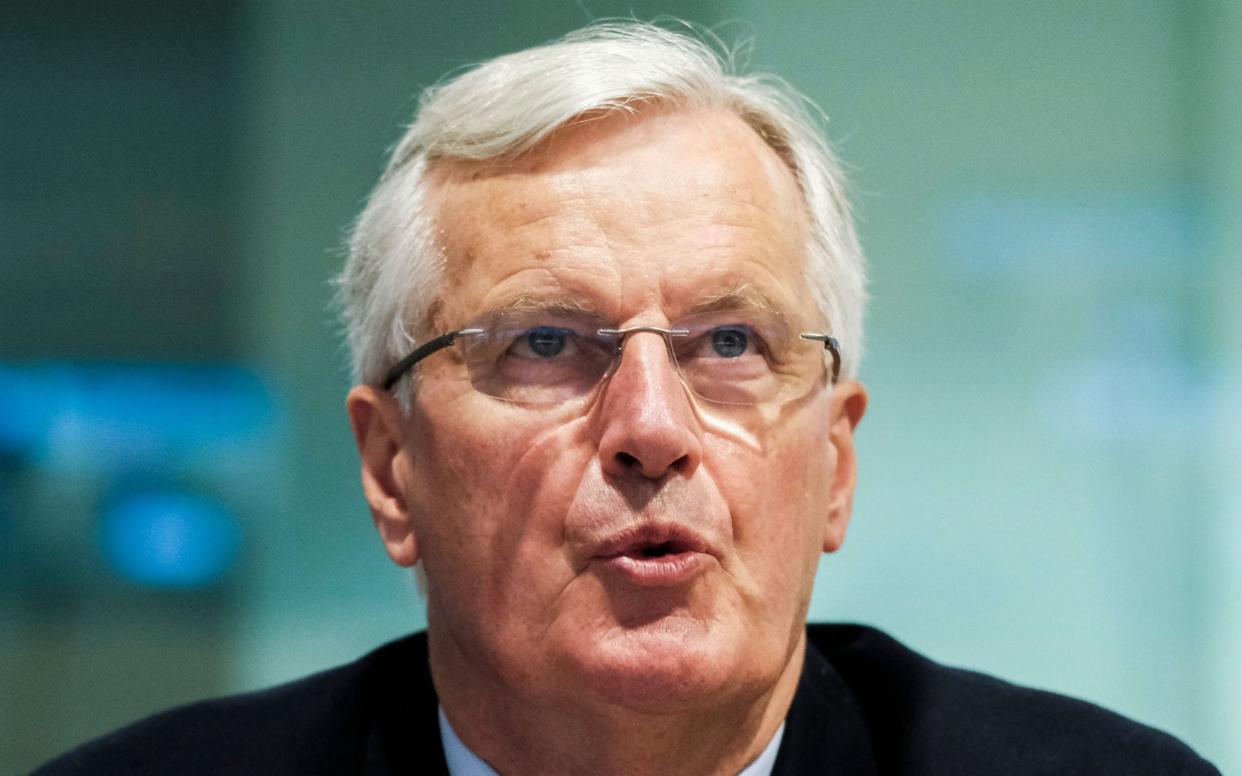London should not be a European financial hub after Brexit, says Michel Barnier

London should lose its status as a European centre for financial and legal services after Brexit, Michel Barnier has said.
The EU chief negotiator said Britain should not be allowed to become a stepping stone into the EU market or a manufacturing hub for the bloc after the end of the transition period this year.
Mr Barnier told representatives of the European Economic and Social Committee that Britain should also not keep its large share of the lucrative market for testing goods to ensure they meet EU standards.
The loss of that 20 percent market share would mean a burdensome and expensive process for UK businesses in which they would have to pay for their products to be shipped to the EU for testing before they can be exported to the bloc.
"During its 47 years of membership, the UK built up a strong position in the EU market in a number of strategic areas, financial, services, businesses, and legal services, and also regulation and certification," Mr Barnier said in a speech in Brussels.
"This was made possible by the fact that the UK was an EU member state within the Single Market. As it prepares to leave the Single Market and leave the Customs Union, we must ask ourselves whether it is really in the EU interest for the UK to retain such a prominent position."
Mr Barnier warned against allowing the UK to assemble materials and goods sourced from all over the world before exporting them to the EU tariff and quota-free as a British good once a trade deal was signed.
This "would allow the UK to become a manufacturing hub for the EU", Mr Barnier said, adding: "Do we really want the UK to remain a centre for commercial litigation for the EU when we could attract these services here?"
European Commission negotiators have turned down repeated British offers for mutual recognition of third party conformity assessments, which would allow UK-based testing laboratories to certify cars, chemicals, marine equipment, organic and pharmaceutical products for export into the EU market.
"Do we really want to consolidate the UK position as a certification hub for the EU, knowing that it already controls some 15 to 20 percent of the EU certification market?" Mr Barnier said.
UK financial services will lose their EU passport at the end of the transition period, which finishes at the end of the year, unless it is extended. Their access to the EU market will be governed by equivalence, which is permission granted by the commission that can be withdrawn with as little as 30 days notice.
Mr Barnier said the UK was wrong when it claimed that it was only asking for what was precedented in the EU's trade deals with other countries.
"The truth is that, in many areas, it is demanding a lot more than Canada, Japan, or any of our other FTA [free trade agreement] partners," he said. "We cannot accept the UK's attempt to cherry pick parts of our single market."
The UK and EU remain deeply divided over fishing rights, the "level playing field" guarantees and the future role of the European Court of Justice after the last round of trade negotiations ended last week.
Mr Barnier said that the EU was ready to compromise to break the deadlock and called on the UK to soften its red lines as well.
"The UK must have taken note of the EU's willingness to search for compromises. What we now need to make progress are clear and concrete signals the UK too is open to work on an agreement," he said.
He claimed that there was no need for the bloc's leaders to give him a new negotiating mandate so he could break the impasse, despite being prevented by EU fishing nations from exploring possible compromises in the last round.
Mr Barnier said he hoped a June meeting between Boris Johnson and Ursula von der Leyen, the president of the European Commission, would bring fresh political impetus to the negotiations this month.
"Member states including Germany and France shared Michel Barnier's dire assessment of the current state of EU-UK talks," a diplomat told The Telegraph after the negotiator briefed EU ambassadors in Brussels.
"Ambassadors expressed the need for more realism in London and expect the UK government to honour its commitments from the political declaration on all issues including the 'level playing field'. Cherry-picking is not an option."
A Number 10 spokesman said: "Brexit is about economic independence, and we gain more by being able to design our own rules to suit the best interests of our businesses and people in future."

